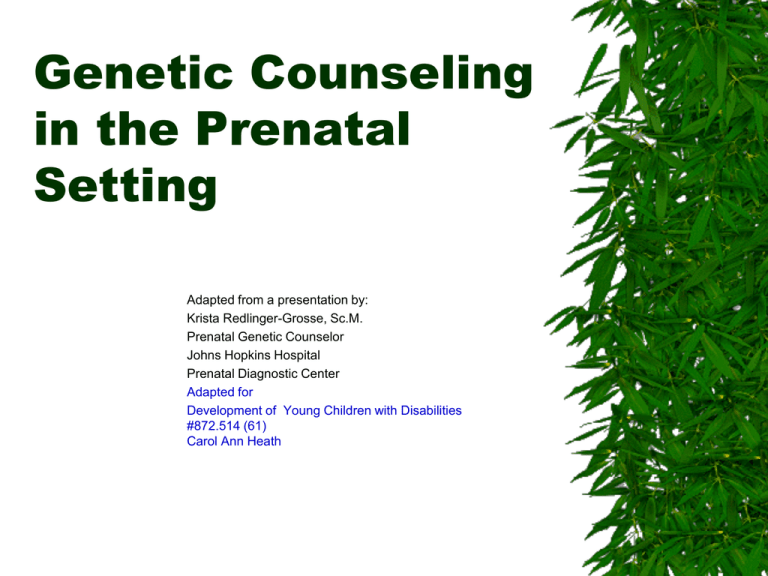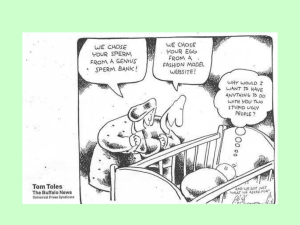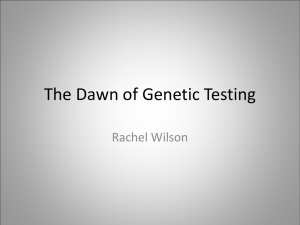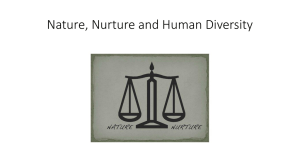
Genetic Counseling
in the Prenatal
Setting
Adapted from a presentation by:
Krista Redlinger-Grosse, Sc.M.
Prenatal Genetic Counselor
Johns Hopkins Hospital
Prenatal Diagnostic Center
Adapted for
Development of Young Children with Disabilities
#872.514 (61)
Carol Ann Heath
Genetic Counseling
– Definition
– History: Models of Genetic Counseling
– Process
– Profession
Prenatal Genetic Counseling
– Process
– Indications
– Prenatal Testing
– Psychosocial Issues
– Ethical Implications
Genetic Counseling
How would you define genetic
counseling?
What experiences (if any) have
you had with genetic
counseling?
Genetic Counseling: Definition
“The genetic counselor is a health professional
who is academically and clinically prepared to
provide genetic services to individuals and
families seeking information about the
occurrence, of risk of occurrence, of a genetic
condition or birth defect. The genetic counselor
communicates genetic, medical, and technical
information in a comprehensive,
understandable, non-directive manner with
knowledge of an insight into the psychosocial
and ethno cultural experiences important to
each client and family. The counselor provides
client-centered, supportive counseling
regarding the issues, concerns, and experiences
meaningful to the client’s circumstances.”
American Board of Genetic
History: Models of Genetic
Counseling
Eugene Model (“well born”)
– Sheldon Reed (1947) coined term
“Genetic Counseling”
– Bateson (1906) – Study of hereditary
“Advising”
people about inherited traits
– Eugenics Records Office at Cold Spring
Harbor
Collected
data and provided information to
affected families
– Mandatory Sterilization of “mentally
defective” (1926)
23
out of 48 United States
Models
Medical/Preventive Model
– 1940’s
– Retreat from “advisement” with a focus on
prevention by offering risk information
Decision-Making Model
– 1950’s – Discovery of cytogenetics of
several chromosomal conditions
– Emphasis on providing information in an
interactive process
Models
Psychotherapeutic Model
– Provision of information alone is not
enough
– Focus on response and experiences
related to genetic conditions
– Framework
therapy – Carl Rogers
Non-directiveness
Client-centered
Genetic Counseling Profession
Masters Training Programs
– 1971 Sarah Lawrence College
– Currently 28 training Programs (USA)
National Society of Genetic
Counselors
– 1979
American Board of Genetic Counseling
– Certification process - 1981
Philosophy of Genetic Services
Voluntary utilization
Equal Access
Client Education
Complete
disclosure of
Information
Nondirective
counseling
Attention to
Psychosocial and
Affective
Dimensions in
counseling
Confidentiality
Process of Genetic Counseling
Information Gathering
– Family and Medical History
Risk Assessment
– Actual risk vs. perceived risk
Information Giving
– “Educators”
Psychosocial Counseling
Genetic Counseling Contexts
Reproductive Issues**
Pediatrics
Preconception counseling
Prenatal
Infertility
Newborn Screening
Specialty Clinics
Adult-Onset conditions
Specialty Clinics
Pre-symptomatic testing: Breast and Colon Cancer,
Huntingtons disease
Prenatal Genetic Counseling
Prenatal Genetic Counseling
Preconception Counseling
Carrier Screening
Family history of genetic condition
– Risks and Pregnancy Options
Pregnancy
Advanced maternal Age
Abnormal Triples Screen- blood test
Family history of genetic condition
Fetus at risk for ____
Infertility
Genetics of infertility
Risks of infertility treatments (ex: ICSI)
Impact of Prenatal
Counseling/Diagnosis
Bonding (Klaus and Kennel, 1982)
– Influence bond formation between mom
and baby
Planning
the pregnancy
Confirmation and acceptance of the
pregnancy
Acceptance of the baby as a separate person
– Timing of prenatal information
Pregnancy “on hold” until results of
testing (Rothman, 1986)- tentative pregnancy
Prenatal diagnostic Techniques
Amniocentesis
Chorionic Villus
Sampling (CVS)
Ultrasound
Maternal blood multiple
marker screening
Chromosomes
Enzymes
DNA Testing
AFP- protein made by liver
Chromosomes
Enzymes
DNA
Fetal Anatomy
Down syndrome, Neural Tube Defects,
trisomy 18
Prenatal Diagnostic Techniques
Amniocentesis
Chorionic Villus Sampling
Maternal Serum Multiple Marker
Screening
Ultrasound
INDICATIONS
Advanced Maternal Age
Definition: Women over the age of 35
Slightly increased risk for chromosome
condition
– Down syndrome- extra #21
– Trisomy 13 and 18- extra 13 & 18 severe
– Sex chromosome conditions
Offered: CVS or Amniocentesis and
Detailed Ultrasound
Advanced Maternal Age
Age Risks
17 wks(%)
Live Birth (%)
33
0.5
0.3
35
0.8
0.5
37
1.2
0.7
39
1.9
1.2
41
3.0
2.0
43
5.0
3.1
Abnormal Triple Screen
Developed in 70’s (AFP) and early 80’s
(“Triple” Screen)
“Offered” to all pregnant women
SCREENING TEST!!! 16-18 weeks
– Down syndrome
– Trisomy 18
– Neural Tube Defects
Three markers: AFP, hCG, uE3
Offered: Ultrasound and/or amniocentesis
Ultrasound finding
May/may not be associated with
chromosome condition or known
genetic condition
Offered: Amniocentesis (possibly CVS)
Family history (previous
pregnancy)genetic condition
Known genetic condition in family
– Single gene disorders
Autosomal
Recessive and Autosomal
Dominant conditions, X-Linked conditions
Slide of inheritance
– Examples: Cystic Fibrosis, Muscular
Dystrophy, Sickle Cell Anemia
Family history cont.
History of unknown “condition”
– Previous child with developmental delay
and additional medical concerns but no
diagnosis
– History of recurring miscarriages/infant
deaths
Offered: CVS/Amniocentesis (or
Preimplantation Genetic Diagnosis
(PGD)?)
Carrier Screening
– Ashkenazi Jewish Population
Tay-Sachs
(1/30), Canavans Disease (1/40),
and Gaucher Disease (1/15)
– Caucasian Population
Cystic
Fibrosis (1/25)
– African-American Population
Sickle
Cell Anemia (1/10)
– Greek/Mediterranean/Asian Population
Thalassemias
Maternal Exposures
Medications- lower dose in pregnancy
– Ex: Seizure medications, Vitamin A
Drug-use
– Ex: Heroin, Cocaine, Alcohol
Other
– Maternal diabetes
Prenatal Counseling:
Process
Information Gathering
Assess interests/needs
Patient’s “agenda”
Family History and Pregnancy History
– ? Additional risks other than indication
Risk Assessment
Information Giving
Perceived risk
Diagnosis/Indication related
Prenatal testing options
Psychosocial Counseling
Psychosocial
Counseling: Issues
Patient’s agenda
Personal Values
Meaning of
Pregnancy
– Infertility vs.
unwanted
pregnancy
Social Support
Past Social History
Perceived
Risks/Benefits of
Anxiety
Decision-making
regarding:
Testing
Test result
Pregnancy
To have or not to
have????
What do you think are some of
the factors to have or not to
have prenatal diagnosis?
Evans et al, 1990: Kolker & Burke, 1993; Marteau, 1995; Van
Spijker, 1992
Decision-making
factors
Faith/Spirituality
Personal Values
– “What’s given”
– Information
Experience with
disability
Beliefs on pregnancy
termination
Partner and family
support
Past experience with
prenatal testing
– Friends and family
Fears of test
Tolerance for
ambiguity
– Need for reassurance
Anxiety given
diagnosis
Doctor’s “advice”
Abnormal Prenatal
Results
Counseling issues
– Crisis and grief counseling
– Support and facilitate decision-making
– Provide information/resources/support groups
Outcome of Pregnancy
– Continuation of pregnancy
– Termination
– Adoption
Prenatal testing:
Ethical
Implications
What do you think are some of
the ethical issues surrounding
prenatal testing?
Ethical Issues:
Disability
Medical Model of Disability
– Implied eugenic Thrust? (Hubbard,1988)
Concern by advocates for persons with disabilities, feminists,
and bioethicists
– At the core of the medical model view is that “disability must be
prevented, because disabled people cannot function within
existing society”
Attribution Theory
“The more help will be given when dependency is attributed to factors
such as lack of ability on the victim’s part (internal but uncontrollable
cause) than when it is attributed to lack of effort on the victim’s part
(internal and controllable cause).”
•
Marteau and Drake (1995)
Ethical Issues
When to say when
– How much testing can/will we offer?
– Where will we draw the line?
Sex
selection
“Perfect” baby
Presymptomatic testing prenatally
– Ex: Breast cancer
Resources
National Society of Genetic counselors (NSGC)
http//www.nsgc.org
Phone: (610) 872-7608
American Board of Genetic Counseling (ABGC)
http://www.faseb/org/genetics/abgc/abgcmenu.htm
Phone:(301) 571-1825
Genetic Alliance (nonprofit organization)
http://www. Geneticalliance.org
Resources
Helpful books:
Baker, D., Schuette, J., and Uhlmann, W. (eds) (1988) A Guide to Genetic
Counseling. New Your: Wiley-Liss
Clarke, A. (ed) (1994) Genetic Counseling: Practice and Principles. London:
Routledge.
Parens, E., and Asch, A. (eds) (2000). Prenatal Testing and Disability
Rights. Washington, DC: Georgetown University Press.
Rapp, R. (1999). Testing Women, Testing the Fetus. New York:
Routledge.
Citations
Black, R. (1992). Seeing the baby: The impact of ultrasound technology.
Journal of Genetic Counseling. 1 (1), 45-54.
Evans, M., Bottoms, S,. Critchfield, G., Greb, A,. & LaFerla, J.
(1990). Parental perception of genetic risk: correlation with choice of prenatal
diagnostic procedures. International Journal of Gynecology-Obstetrician, 31,
25-28.
Hubbard, R. (1988). Eugenics: New tools, Old Ideas. Women Health, 12(12), 225-235.
Klaus, M. and Kennel, J. (1982). Parental Infant Bonding. CV Mosby co.
Kolker, A., & Burke, B. (1994). Prenatal Testing: A Sociological Perspective.
Westport, CN: Bergen and Harvey
Citations
Lippman, A. (1991). Prenatal genetic testing and screening:
Constructing needs and reinforcing inequities. American Journal of Law and
Medicine, 17, 15-49.
Mataeu, T.,& Drake, H. (1995) Attributions for disability: The influence of
genetic screening. Social Science and Medicine, 40(8), 1127-1132.
Rothman, B. (1986). The tentative pregnancy. New York: Viking.
Van Spijker, H. (1992) Support in decision-making processes in the postcounseling period. Birth Defects: Original Article Series, 28(1), 29-35









